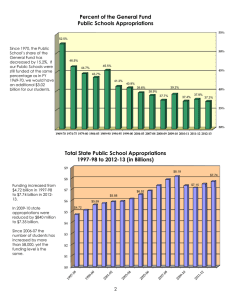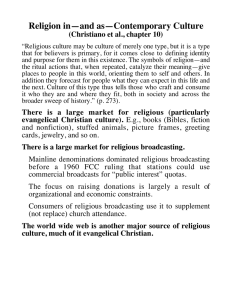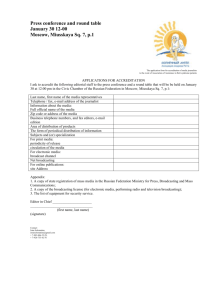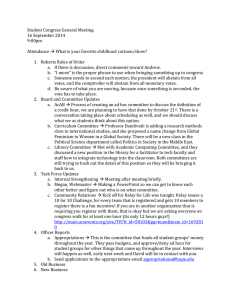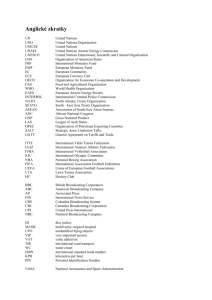CRS Report for Congress State Department and Related Agencies FY2001 Appropriations
advertisement
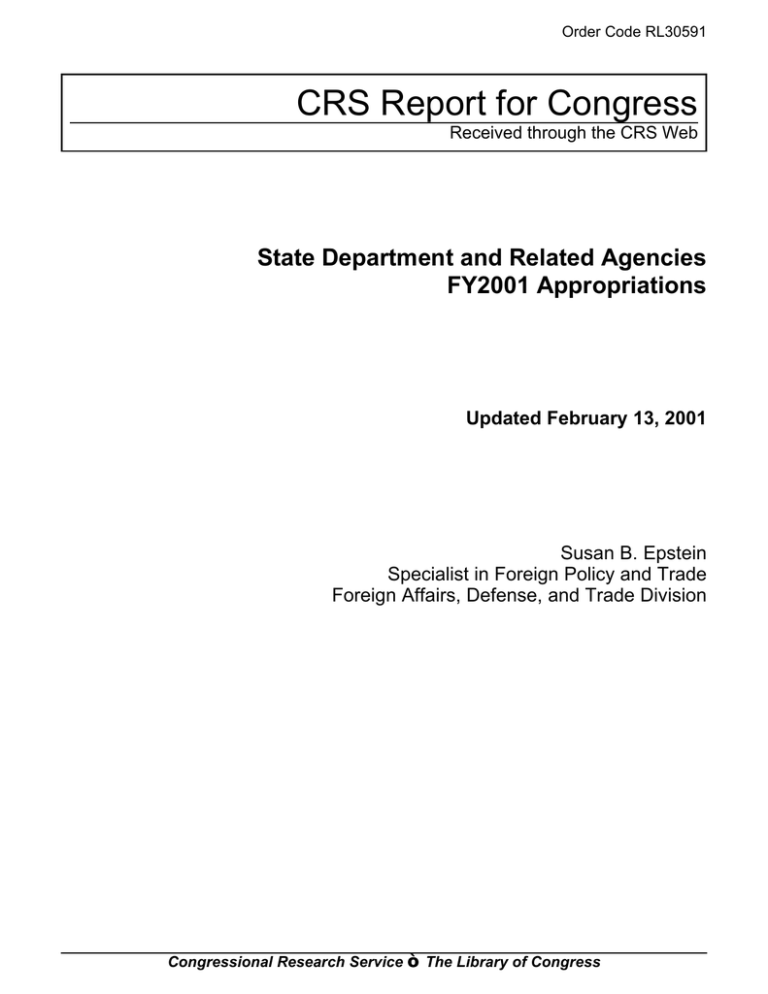
Order Code RL30591 CRS Report for Congress Received through the CRS Web State Department and Related Agencies FY2001 Appropriations Updated February 13, 2001 Susan B. Epstein Specialist in Foreign Policy and Trade Foreign Affairs, Defense, and Trade Division Congressional Research Service ˜ The Library of Congress State Department and Related Agencies FY2001 Appropriations Summary On February 7, 2000, the President submitted his FY2001 budget request which included nearly $7 billion for the Department of State and the Broadcasting Board of Governors. This represented an increase of $661.5 million (or 10.5%) from the FY2000 enacted level which Congress had passed in an omnibus bill on November 19, 1999; the President had signed it into law (P.L. 106-113) on November 29, 1999. Earlier, the Foreign Affairs Reform and Restructuring Act of 1999 (P.L. 105277, section 1001) had required the foreign policy agencies to be reorganized before FY2000. Subsequently, the Arms Control and Disarmament Agency (ACDA) merged its functions into the Department of State, and the U.S. Agency for International Development (USAID) reorganized and came directly under the authority of the Secretary of State as of April 1, 1999. The U.S. Information Agency (USIA) consolidated its information and exchange functions into the Department of State, while as of October 1, 1999 the broadcasting functions became an independent agency referred to as the Broadcasting Board of Governors (BBG). The Administration’s FY2001 request would have: 1) provided more than $1 billion for worldwide security upgrades at U.S. facilities, 2) continued increasing the capital investment fund, and 3) increased U.S. Contributions to the U.N.’s International Organizations (CIO) and its U.N. Contributions to International Peacekeeping (CIPA) funds. In addition, the international broadcasting budget request of $6.96 billion represented a 6.3% increase over the FY2000 level. The House Commerce, Justice, State (CJS) Appropriations Subcommittee reported out its version of the CJS FY2001funding legislation on June 6, 2000. The full House Appropriations Committee reported out its version on June 15th. The bill (H.R. 4690) was formally introduced on June 19, 2000. House floor action occurred on June 22nd and 23rd; the House passed the bill (214-195-1) on June 26, 2000 after agreeing to transfer $10 million out of State and into the Legal Services Corp. The House funding level for the State Department and international broadcasting totaled $6.55 billion. The Senate Appropriations Committee reported their version of H.R. 4690 on July 18, 2000. The Senate Committee recommended no significant increase in worldwide security upgrade funding, but a 30% increase in the Capital Investment Fund and 10% increase in exchange programs. The Senate Committee recommended a total FY2001 funding level of $6.56 billion for State and international broadcasting. On October 27, 2000, Congress approved the CJS conference report (H.R. 4942; H.Rept. 106-1005). The President signed the measure into law on December 21, 2000 (H.R. 5548 as contained in the conference report on H.R. 4942; P.L. 106553). This is the final update of this report. Contents Background . . . . . . . . . . . . . . . . . . . . . . . . . . . . . . . . . . . . . . . . . . . . . . . . . . . . 1 State Department . . . . . . . . . . . . . . . . . . . . . . . . . . . . . . . . . . . . . . . . . . . . . . . . Administration of Foreign Affairs . . . . . . . . . . . . . . . . . . . . . . . . . . . . . . . . International Organizations and Conferences . . . . . . . . . . . . . . . . . . . . . . . International Commissions . . . . . . . . . . . . . . . . . . . . . . . . . . . . . . . . . . . . . Related State Department Appropriations . . . . . . . . . . . . . . . . . . . . . . . . . 2 2 4 5 5 Broadcasting Board of Governors . . . . . . . . . . . . . . . . . . . . . . . . . . . . . . . . . . . 7 List of Tables State Department, USIA, and Related Agencies Appropriations . . . . . . . . . . . . . 8 State Department and Related Agencies FY2001 Appropriations Background Budgets for the Department of State and the Broadcasting Board of Governors (BBG), as well as U.S. contributions to United Nations (U.N.) International Organizations and Peacekeeping are all within the Commerce, Justice, State and Related Agency (CJS) appropriations. Intertwined with the annual appropriations process is the biannual Foreign Relations Authorization that, by law, Congress must pass prior to the State Department’s expenditure of its appropriations. On April 1, 1999, largely for budgetary savings and streamlining U.S. foreign policy, consolidation of the foreign policy agencies began with the merger of the functions of the Arms Control and Disarmament Agency (ACDA) into the State Department; as of October 1, 1999, the functions of the U.S. Information Agency (USIA), excluding international broadcasting, also came directly under the State Department. Although not part of the CJS appropriations, the U.S. Agency for International Development (USAID) was required to reorganize and come directly under the authority of the Secretary of State by April 1, 1999.1 (For more details on USAID, see CRS Report RL30511, Appropriations for FY2001: Foreign Operations, Export Financing, and Related Programs, by Larry Nowels.) The Administration’s FY2001 State Department and International Broadcasting budget request totaled $6.96 billion, 10.5% above the FY2000 enacted funding level. Overseas security funding continued to be a key issue in the FY2001 CJS appropriations debate. (For more details, see CRS Report 98-771, Embassy Security: Background, Funding, and FY2001 Budget.) Noticeably absent in the President’s request was any indication of budget savings attributable to the completed foreign policy agency consolidation. Secretary of State Albright testified on the FY2001 State Department appropriations request before House and Senate Committees in February and March 2000. On June 26 the House passed H.R. 4690 providing $6.11 billion for the Department of State and $438.1 million for international broadcasting. The Senate received H.R. 4690 on June 27, 2000. The Senate Appropriations Committee reported its version of the bill July 18, 2000, recommending $6.1 billion for the Department of State and $441.6 million for international broadcasting. On October 27, 2000 Congress passed the CJS conference report (H.R. 4942, H.Rept. 106-1005). After numerous continuing resolutions, the President signed into law (P.L. 106-553) the CJS appropriations portion of H.R. 4942 as contained in H.R. 5548. The enacted 1 The Foreign Affairs Reform and Restructuring Act of 1999 (Section 1001 of P.L. 105-277). CRS-2 FY2001 appropriation provides $6.6 billion for the Department of State and $451.5 million for international broadcasting for a total of $7.1 billion–nearly $100 million more than the Clinton Administration had requested. State Department The State Department’s mission is to advance and protect the worldwide interests of the United States and its citizens through the staffing of overseas missions, the conduct of U.S. foreign policy, the issuance of passports and visas, and other responsibilities. Currently, the State Department coordinates with the activities of 50 U.S. government agencies and organizations in operating 250 posts in over 180 countries around the world. The Department’s staff size has increased, largely because of the integration of ACDA and USIA into State. Highlights follow. Administration of Foreign Affairs ! Diplomatic and Consular Programs (D&CP) – The D&CP account funds overseas operations (e.g., motor vehicles, local guards, telecommunications, medical), activities associated with conducting foreign policy, passport and visa applications, regional bureaus, under secretaries, and post assignment travel. Beginning in FY2000, the State Department’s Diplomatic and Consular Program account included State’s salaries and expenses, USIA’s technology and information functions, and ACDA. The FY2000 level passed by Congress for this account totaled $2.823 billion. The Administration’s FY2001 request for this account equaled $3.104 billion, including $410 million for embassy security expenses (most of which would be for recurring costs such as: salaries of increased security guard services, ongoing personnel security training, and upkeep of added information systems, software, and armored vehicles). The House Appropriations Committee recommended $3.089 billion, including $410 million for worldwide security upgrades. The Senate Appropriations Committee recommended $3.148 billion for D&CP, including $272.7 million for worldwide security upgrades. The final amount passed by Congress is $3.168 billion with $410 million for worldwide security upgrades. ! Security and Maintenance of Overseas U.S. Missions – This account supports the maintenance, rehabilitation, and replacement of overseas facilities to provide appropriate, safe, secure and functional facilities for U.S. diplomatic missions abroad. Congress originally had enacted $640 million for this account for FY1999. However, following the embassy bombings in Africa in August 1998, Congress agreed to more than $1 billion for the Security and Maintenance account when passing an emergency supplemental with a new subaccount referred to as Worldwide Security Upgrades. The FY2000 appropriation for the overall account was $742.2 million – $428.6 million for the Security and Maintenance account and $313.6 CRS-3 million for Worldwide Security Upgrades. The Administration’s FY2001 request for these functions was $431.2 million for the Security and Maintenance account and $648 million for Worldwide Security Upgrades. In addition to its annual appropriation request, the Administration sought $3.35 million advance appropriations for FY2002-2005. The House Appropriations Committee recommended $416.98 million for Security and Maintenance and matched the President’s request of $648 million for Worldwide Security Upgrades. The House agreed with these amounts, but did not include funding for advance appropriations for overseas security. The Senate Appropriations Committee recommended $417.1 million for Security and Maintenance and $364.9 million for Worldwide Security Upgrades. The enacted appropriation includes $417 million for Security and Maintenance and $663 million for Worldwide Security Upgrades. In November 1999 the State Department-appointed Overseas Presence Advisory Panel (OPAP) released its report, which recommended several security actions to contribute to the safety of American personnel and facilities abroad. The House Appropriations Committee noted that the Department has begun implementing some of the recommendations, while others require interagency or legislative actions. (For more detail see CRS report 98-771, Embassy Security, Background, Funding, and the FY2001 Budget, by Susan B. Epstein.) ! Educational and Cultural Exchanges – This account funds programs authorized by the Mutual Educational and Cultural Exchange Act of 1961, such as the Fulbright Academic Exchange Program, as well as leadership programs for foreign leaders and professionals. Government exchange programs have come under close scrutiny in recent years for being excessive in number and duplicative. By a July 1997 executive order, the Office of U.S. Government International Exchange and Training Coordination was created. Congress appropriated $205 million for FY2000 for Educational and Cultural Exchanges, but did not specify a level for the Fulbright program. The Administration request for FY2001 was $225 million. The House passed $213.8 million for exchanges. The Senate recommended providing the Administration with its requested $225 million. Congress passed $231.6 million ($6 million more than requested) for the international exchanges account, including $114 million for the Fulbright Program. ! The Capital Investment Fund (CIF) – CIF was established by the Foreign Relations Authorization Act of FY1994/95 (P.L. 103-236) to provide for purchasing information technology and capital equipment which would ensure the efficient management, coordination, operation, and utilization of State’s resources. In FY1998 Congress approved a 250% increase in this fund, from $24.6 million in FY1997 to $86 million in FY1998. The Administration sought $118.3 million (an increase of 38%) in FY1999 for CIF. CRS-4 Congress exceeded the request, agreeing to $158.6 million for this account, which included funds from the emergency supplemental appropriation for Y2K compliance. The FY2000 request for CIF would have reduced funding to $90 million, plus an additional $50 million from expedited passport fees. Congress agreed to $80 million. The Administration request for CIF in FY2001 was $97 million, although the House Appropriations Committee recommended $79.7 million. The Committee expressed a concern that this funding level, combined with Machine Readable Visa fees available Department-wide, would provide State with an “enormous” investment in information technology of $491.9 million and no quantifiable way to measure its success. The House agreed with the Committee, funding CIF at $79.7 million. The Senate Committee recommended increasing CIF to $104 million in FY2001. Congress appropriated $97 million–the Administration’s request–for CIF. International Organizations and Conferences ! Contributions to International Organizations (CIO) – CIO provides funds for U.S. membership in numerous international organizations and for multilateral foreign policy activities that transcend bilateral issues, such as human rights. Maintaining a membership in international organizations, the Administration argues, benefits the United States by advancing U.S. interests and principles while sharing the costs with other countries. Payments to the United Nations (U.N.) and its affiliated agencies, the Inter-American Organizations, as well as other regional and international organizations are included in this account. The FY2000 appropriation set CIO funding at $885.2 million. Congress also appropriated $351 million for U.S. arrearage payments to the U.N. So far, $100 million has been paid. The remainder is being withheld until U.N. reforms are completed. The Administration’s FY2001 request for U.S. Contributions to International Organizations equaled $946 million. The House full Committee recommended $880.5 million to which the House agreed. The Senate Appropriations Committee reported $943.9 million for CIO and $102 million for arrearage payments. Congress appropriated $870.8 million. (For more detail, see CRS Issue Brief IB86116, U.N. System Funding: Congressional Issues, by Vita Bite.) ! Contributions to International Peacekeeping Activities (CIPA) — The United States supports multilateral peacekeeping efforts around the world through payment of its share of the U.N. assessed peacekeeping budget. Multilateral peacekeeping often provides an alternative between doing nothing and unilateral U.S. action in overseas situations of importance to the United States. Congress approved $500 million for this account for FY2000. The Administration’s FY2001 request for CIPA (which does not include NATO peacekeeping costs) totaled $738.7 million and sought it as “two-year funds,” noting the unpredictability of peacekeeping from CRS-5 one year to the next. The House Committee recommended $498.1 million for this account in FY2001 and rejected the request for twoyear funding. Furthermore, the House Committee listed specific peacekeeping missions that were not to get funding under this account, including MINURSO in Western Sahara, UNAMSIL in Sierra Leone, UNMOT in Tajikistan, as well as a request for a new mission in Ethiopia and Eritrea. The House-passed legislation included the same level of funding–$498.1 million, but did not include language specifying missions that would not get funding. The Senate full Committee recommended $500 million for peacekeeping. The final funding level, greater than the Administration request, totals $846 million. (For more detail, see CRS Issue Brief IB90103, United Nations Peacekeeping: Issues for Congress, by Marjorie Ann Browne.) International Commissions The International Commissions account includes the U.S.-Mexico Boundary and Water Commission, the International Fisheries Commissions, the International Boundary Commission, the International Joint Commission, and the Border Environment Cooperation Commission. The FY2000 enacted level for International Commissions totaled $46.8 million. The FY2001 request equaled $62.2 million. The 32.9% increase resulted from an $8.5 million increase in the International Boundary and Water Commission (largely for construction) and nearly $4 million increase in the International Fisheries Commission, a large portion of which was for the Great Lakes Fishery Commission. The House Appropriations Committee recommended a continuation of the FY2000 funding level for FY2001. A House floor amendment transferring $500,000 from DC&P to the International Boundary and Water Commission was agreed to, setting the International Commissions total at $47.1 million. The Senate Committee recommendation totaled $60 million for international commissions. Congress compromised with an enacted level of $56.2 million. Related State Department Appropriations ! The Asia Foundation – The Asia Foundation is a private, nonprofit organization that supports efforts to strengthen democratic processes and institutions in Asia, open markets, and improve U.S.-Asian cooperation. The Foundation receives both government and private sector contributions. Government funds for the Asia Foundation are appropriated to, and pass through, the State Department. Congress funded The Asia Foundation at $8.2 million for FY2000. The Administration’s FY2001 request for the Foundation of $10 million reflects a 22% increase over the current level, mainly to develop stronger and more open market economies, particularly in China. The House Appropriations Committee recommended continuing The Asia Foundation at its FY2000 level and the House agreed. The Senate did not include any funds for The Asia Foundation for FY2001. The final CJS appropriation contained $9.3 million for The Asia Foundation in FY2001. CRS-6 ! National Endowment for Democracy (NED) – The National Endowment for Democracy, a private nonprofit organization established during the Reagan Administration, supports programs to strengthen democratic institutions in more than 90 countries around the world. NED proponents assert that many of its accomplishments are possible because it is not a government agency. NED’s critics claim that it duplicates U.S. government democracy programs and either could be eliminated or could operate entirely with private funding. NED’s FY2000 enacted appropriation was a continuation of the previous year’s level of $31 million. The Administration requested a slight increase – to $32 million – for FY2001. The House Appropriations Committee and the House concurred on funding NED at $30.9 million for FY2001. The Senate Appropriations Committee recommended setting NED funding at $31 million for FY2001. The Congressionally-passed level is $31 million. ! East-West and North-South Centers – The Center for Cultural and Technical Interchange between East and West (East-West Center), located in Honolulu, Hawaii, was established in 1960 by Congress to promote understanding and cooperation among the governments and peoples of the Asia/Pacific region and the United States. The Center for Cultural and Technical interchange between North and South (North-South Center) is a national educational institution in Miami, FL, closely affiliated with the University of Miami. It promotes better relations, commerce, and understanding among the nations of North America, South America and the Caribbean. The North-South Center began receiving a direct subsidy from the federal government in 1991. The Administration’s FY1999 budget had recommended phasing out government funding of both the East-West and North-South Centers. The House had set zero funding for both Centers in FY1999, while the Senate had agreed to double North-South Center funding to $3 million, and continue the East-West Center at its FY1998 level of $12 million. P.L. 105-277, however, contained $12.5 million for the East-West Center and $1.75 million for the North-South Center. The FY2000 budget continued these levels for both the North-South and East-West Centers. The FY2001 request continued these levels, while the House again voted to zero out government funding for both Centers in FY2001. The Senate Committee recommended $13.5 million for the East-West Center, but did not include the North-South Center in its version of the appropriation bill. Congress provided $13.5 million for the East-West Center, but no funds for the North-South Center for FY2001. CRS-7 Broadcasting Board of Governors The United States International Broadcasting Act of 19942 reorganized within USIA all U.S. government international broadcasting, including Voice of America (VOA), Broadcasting to Cuba, Radio Free Europe/Radio Liberty (RFE/RL), Radio Free Asia (RFA), and the newly-approved Radio Free Iraq and Radio Free Iran. The Act established the Broadcasting Board of Governors (BBG) to oversee all U.S. government broadcasting; abolished the Board for International Broadcasting (BIB), the administering body of RFE/RL; and recommended that RFE/RL be privatized by December 31, 1999. During reorganization debate, the 105th Congress agreed that credibility of U.S. international broadcasting was crucial to its effectiveness as a public diplomacy tool. Therefore, Congress agreed not to merge broadcasting functions into the State Department, but to maintain the Broadcasting Board of Governors (BBG) as an independent agency as of October 1, 1999. Congress appropriated an FY2000 total of $421.8 million for international broadcasting, including $22.1 million for Broadcasting to Cuba and $21.9 million for Radio Free Asia. The FY2001 budget request for international broadcasting was $448.4 million, a 6.3% increase. The request includes $23.5 million for Cuba Broadcasting. The House Appropriations Committee voted to provide $438.1 million to the BBG, including $22.8 million for Cuba Broadcasting. The House passed these amounts. The Senate Appropriations Committee recommended a total of $441.6 million for international broadcasting – $388.4 million for broadcasting operations and $22.1 million for Cuba Broadcasting. Congress enacted a total of $451.5 million for international broadcasting, including $22.1 million for Cuba Broadcasting. The BBG’s total funds also include funding for a Broadcasting Capital Improvements account (formerly USIA’s Radio Construction account) which funds the building or renovating of radio stations, upgrading and refurbishing station capabilities, updating technology, and replacing old transmitters. The FY2000 appropriation for this account was $11.3 million. The President’s FY2001 request was $19.8 million, a 75% increase over FY2000, most of which would pay for relocation of the Poro medium wave transmitting facility in the Philippines. The House Committee recommended and the House agreed to $18.3 million for the Broadcasting Capital Improvements account. The Senate Committee reported in its version of H.R. 4690 $31.1 million for Broadcasting Capital Improvements in FY2001. The FY2001 enacted level is $20.4 million for Capital Improvements. 2 Title III of the Foreign Relations Authorization Act, Fiscal Years 1994 and 1995, P.L. 103236. CRS-8 State Department, USIA, and Related Agencies Appropriations (millions of dollars) FY1998 Enacted State Department Diplomatic & Consular Program Salaries and expenses ACDA Information Programs (USIA S&E) Technology Fund (USIA) Ed & cultural exchange prog. (USIA) Office of Inspector General Representation allowances Protec.-missions & officials Security/maintenance of buildings Worldwide security upgrades Emergency-diplo. & consular services Repatriation loans Payment American Inst. Taiwan Foreign Service Retirement Fund Capitol Investment Fund Total, Administration of Foreign Affairs International Organ. & Conf. Contributions to international organizations Contributions to international peacekeeping U.N. Arrearage payments International conf./contingencies FY1999 Enacted 1,730.0 363.5 1,661.6 354.2 [427.1] [5.1] 197.7 27.5 4.2 7.9 397.9 -.5.5 1.2 14.0 129.9 86.0 2,773.7 955.5 256.0 0.0 FY2000 Enacted FY2001 Request FY2001 House Senate +/- FY2000 version version FY2001* (%) H.R. 4690 H.R. 4690 enacted 3,104.3 9.9% 3,089.3 3,148.5 3,168.7 453.8 11.6 200.5 28.5 4.4 8.1 1,081.1 785.7 17.5 1.2 14.8 132.5 158.6 4,914.1 2,823.8 -.-.-.-.205.0 27.5 5.9 8.1 428.6 313.6 5.5 1.2 15.4 128.5 80.0 4,043.1 225.0 29.5 6.0 10.5 431.1 648.0 11.0 1.2 16.3 131.2 97.0 4,711.1 9.8% 7.3% 1.7% 29.6% 1.6% 106.6% 100.0% 0.0% 5.8% 2.1% 21.3% 16.5% 213.8 28.5 5.8 8.1 417.0 648.0 5.5 1.2 16.3 131.2 79.7 4,644.4 225.0 29.4 6.8 10.5 417.1 364.9 11.0 1.2 16.3 131.2 104.0 4,465.9 231.6 28.5 6.5 15.5 417.0 663.0 5.5 1.2 16.3 131.2 97.0 4,782.0 933.6 219.4 475.0 -.- 885.2 500.0 351.0 -.- 946.1 738.7 -.-.- 6.9% 47.7% -.-.- 880.5 498.1 943.9 500.0 102.0 -.- 870.8 846.0 -.-.- CRS-9 FY1998 Enacted 1,211.5 44.0 8.0 4,037.3 FY1999 Enacted 1,628.0 45.8 8.3 6,596.2 Total International Organ. & Conf. Total International Commissions The Asia Foundation Total pre-merger State Department Related Appropriations The Asia Foundation National Endowment for Democracy 30.0 31.0 East-West Center 12.0 12.5 North-South Center 1.5 1.8 Eisenhower Exchange .6 .5 Israeli Arab Scholarship .4 .4 Total Related Appropriations 44.5 46.2 Total post-merger State Department –.– –.– International Broadcasting Capital Improvements 40.0 13.2 Broadcasting Operations 391.5 362.4 Broadcasting to Cuba (22.1) 22.1 Radio Free Asia (25.0) -.Total International Broadcasting 431.5 397.7 Total USIA 1,105.9 1,108.7 Total ACDA 41.5 41.5 TOTAL State & Broadcasting 5,184.7 7,040.1 *Does not include the Government-wide rescission of 0.22 percent for FY2001. FY2000 Enacted 1,736.6 46.8 -.- FY2001 House Senate FY2001 +/- FY2000 version version FY2001* Request (%) H.R. 4690 H.R. 4690 enacted 1,684.8 -3.0% 1,378.6 1,545.9 1,716.8 62.2 32.9% 47.1 60.0 56.2 -.-.-.-.-.-.-.-.- 8.2 31.0 12.5 1.8 0.5 0.3 54.3 5,880.8 10.0 32.0 12.5 1.8 0.5 0.4 57.2 6,515.3 22.0% 3.2% 0.0% 0.0% 0.0% 33.0% 5.9% 10.8% 8.2 30.9 0.0 0.0 0.5 0.4 40.0 6,110.0 -.31.0 13.5 -.-.-.44.5 6,116.3 9.3 31.0 13.5 -.0.5 0.4 54.7 6,609.7 11.3 388.4 22.1 -.421.8 -.-.6,302.6 19.8 405.1 23.5 -.448.4 75.2% 4.3% 6.3% -.6.3% -.-.10.5% 18.3 419.8 (22.8) -.438.1 -.-.6,548.1 31.1 388.4 22.1 -.441.6 -.-.6,557.9 20.4 399.0 22.1 -.451.5 -.-.7,061.1 6,963.7
